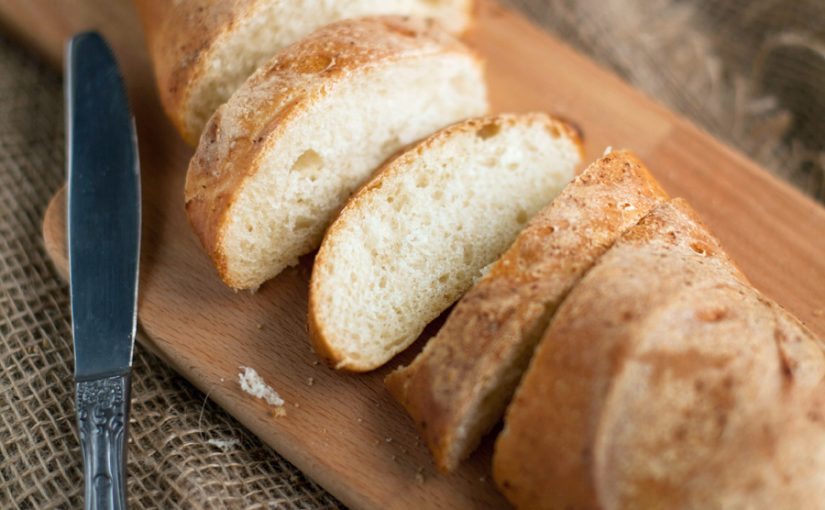A homily for The Solemnity of the Most Holy Body and Blood of Christ, June 22, 2025
Genesis 14:18-20, 1 Corinthians 11:23-26, Luke 9:11b-17
Many folks know I’m a retired journalist, which means I made my living for four decades through the careful use of words. So let’s take a moment today to think about an important word. A word that’s important today and every day.
The word is “this.”
T-H-I-S.
“This” belongs to one of those triads we Westerners toss around like beanbags. This, that, or the other thing. Yesterday, today and tomorrow. Here, there and everywhere.
And if we think about it, even my short list of triads wouldn’t have sounded right if I mentioned only two or upped the count to four. We’re Trinitarian by nature: rock, paper, scissors.
Yes, “this” is an everyday occurrence. We say, “I want this one,” and then point when we choose a car, a kitten or a Krispy Kreme.
Jesus elevated “this” beyond the everyday. Jesus elevated “this” to the divine when he told the Apostles, “Do this in memory of me.”
Every time a priest, through the power of our Savior, causes simple bread and wine to transubstantiate into the Holy Body and Blood of Christ, he prays as Jesus did at the Last Supper.
Take this, all of you, and eat of it,
for this is my Body,
which will be given up for you.
Take this, all of you, and drink from it,
for this is the chalice of my Blood,
the Blood of the new and eternal covenant,
which will be poured out for you and for many
for the forgiveness of sins.
Do this in memory of me.
At the focal point of our shared liturgy, at the point in Mass when our Lord becomes physically present in our midst, at the Eucharistic source and summit of our Christian lives, the word “this” is said five times.
That’s significant.
And with the elevation of the host and the chalice, we clearly see the supreme gift the Christ gave us, to nourish us physically, emotionally and spiritually. To give us a North Star to follow home to God and God’s kingdom. To challenge us to bring that same heavenly kingdom to life on this fragile and battered blue marble we call the Earth.
And so, as we celebrate in a special way today, as the carpenter from Nazareth commanded us, we do this in his memory. And we cherish the Eucharist by giving thanks. Which is what “Eucharist” means.
We remember, we celebrate, we believe.
And there is no doubt theologically that when Jesus commanded his disciples — then, now and forever — to “do this in memory of me,” he meant the Eucharist.
Absolutely.
No doubt whatsoever.
But we also know Scripture isn’t always yes or no, black or white. Scripture gives us a prime opportunity to read between the lines.
So just for a moment, let’s consider this about “this” — our “T-H-I-S this.”
In consecrating the bread, Jesus declared that it is his body, given up for us. In consecrating the wine, our Lord states that it is his blood, which would be poured out for us.
At his Last Supper, at his breaking of the bread, Jesus foreshadowed his ultimate sacrifice on the Cross at Golgotha. He told the Apostles — he told us — how much he would do for the salvation of humankind.
Elsewhere in the New Testament, we hear our Messiah amplifying the Two Great Commandments — Love God and love your neighbor as yourself — by decreeing that we all should love one another as he loved us.
And he loved us to his death, after preaching and healing and comforting throughout the Holy Land. Getting blisters and donkey dust on his feet and sweating drops as of blood.
So maybe — just maybe — doing “this” is not merely transforming bread and wine into the Most Holy Body and Blood of Christ — as if anything could be more important or divine than that.
Nevertheless …
Maybe — just maybe — Jesus weaved in a secondary command, a secondary meaning or significance to “this.” To what he considered the totality of his “this.”
Jesus died for our sins and rose from the dead to give us a beacon to follow forever. A road map. A plan of action and a call to action.
Maybe the other “this” Jesus wants us to do in his memory is to care for our sisters and brothers in every way our God-given skills, talents and personalities enable us. To care for the whole of humankind by feeding and clothing and sheltering the least among us. To work for justice and peace worldwide and close to home, and care for all of Creation.
To live every moment sacrificially as members of the Body of Christ.
